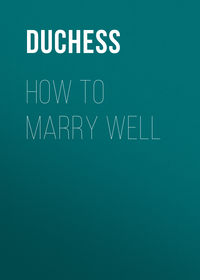 полная версия
полная версияRossmoyne
At this, before he is half prepared, she cries, "one, two, three," with scandalous haste, and rushes away from him down the moonlit path. Swift and straight as a deer she flies, but, alas! just as the goal is all but reached, she finds the race is not to her, and that she is a prisoner in two strong arms!
"Now, who was presumptuous?" says Desmond, gazing into her lovely face. Her head, with a touch of exhaustion about it, is thrown back against his chest; through her parted lips her breath is coming with a panting haste, born of excitement and her fruitless flight. He bends over her, lower, and lower still. She feels herself altogether in his power.
"As you are strong, be merciful," she whispers, faintly. A warm flood of crimson has dyed her cheeks; her smile has faded; she struggles slightly, and then all in one moment Desmond becomes aware that tears have sprung into her eyes.
Instantly he releases her.
"Darling, forgive me," he says, anxiously. "See how your heart is beating now, and all for nothing! Of course I shall let you off your bargain. What do you take me for? Do you think I should make you unhappy for all the world could offer? Take those tears out of your eyes this instant, or I shall be seriously angry with you."
Monica laughs, but in a rather nervous fashion, and lets her lover dry her eyes with his own handkerchief. Then she sits down with him upon a rustic seat close by, wishing to be quite mistress of herself again before encountering the glare of the drawing-room lamps and the still more searching light of her friends' eyes.
For a full minute not a word is spoken by either of them She is inwardly troubled; he is downcast. Presently she rises with a little restless movement.
"No, do not stir just yet," she says. "I only want to pick some of that syringa behind you, it is so sweet."
Disinclined for action of any sort, he obeys her. She slips away behind him, and he sits there waiting listlessly for her return, and thinking, somewhat sadly, how small a way he has made with her, and that she is almost as shy with him now as on that day by the river when first they met.
And then something marvellous happens that puts all his theories and regrets and fears to flight forever. Two soft arms – surely the softest in this wide glad world – steal round his neck; a gold-brown head is laid against his; a whisper reaches him.
"You were very good to me about that!" says somebody, tremulously; and then two warm childish lips are laid on his, and Monica is in his arms.
"I wonder what it was that frightened you?" says Desmond, in a tender whisper, drawing her down on his knees and enfolding her closely as though she were in form the child that verily at heart she still is. "Tell me."
"I don't know." She has twined her bare beautiful arms around him, and is rubbing her cheek softly up and down against his in a fresh access of shyness.
"I think you do, my dearest."
"It was only this; that when I found I couldn't get away from you, I was frightened. It was very foolish of me, but whenever I read those stories about prisoners of war, and people being confined in dungeons, and that, I always know that if I were made a captive I should die."
"But surely your lover's arms cannot be counted a prison, my life!"
"Yes, if they held me when I wanted to get away."
"But," reproachfully, "would you want to get away?"
She hesitates, and, lifting one arm, runs her fingers coaxingly through the hair fashion has left him.
"I don't want to go away now, at all events," she temporizes sweetly. Then, a moment later, "But I must, nevertheless. Come," nervously, "we have been here a long time, and Madam O'Connor will be angry with me; and besides," pityingly, "you have all that long drive home still before you."
"I forgot all about the time," says Desmond, truthfully. "You are right: we must go in. Good-night again, my own."
Without waiting for permission this time, he stoops and presses his lips to hers. An instant later he knows with a thrill of rapture that his kiss has been returned.
CHAPTER XXIII
How Mary Browne makes confession, though not by creed a Romanist; and how those who receive it are far removed from being holy fathers! – Moreover, I would have you see there is more acting off the stage than on it.
Monica's week at Aghyohillbeg is drawing to a close. The day has dawned that is to usher in at even the famous representation of "The School for Scandal," as given by Miss Fitzgerald, Captain Cobbett, etc.
The whole house is topsy-turvy, no room being sacred from the actors and actresses (save the mark!), and all the servants are at their wit's end. There have been men down from the Gayety Theatre, Dublin, who have seen about the stage, and there have been other men from the village of Rossmoyne to help in the decoration of the ballroom, and between these two different sets of men an incessant war has been raging for many days.
Now at last the house is comparatively quiet, and, as four o'clock strikes, Madam O'Connor finds herself in her own special den (the only spot that has not been disturbed), with a tea-equipage before her, and all her ladies-in-waiting round her.
These ladies, for the most part, are looking full of suppressed excitement, and are in excellent spirits and irreproachable tea-gowns. Mary Browne, who has developed into a general favorite, is making some laughing remark about Lord Rossmoyne, who, with all the other men, is absent.
"D'ye know what it is, Mary?" says Madam O'Connor, in her unchecked brogue; "you might do something else with Rossmoyne besides making game of him."
"What?" says Mary Browne.
"Marry him, to be sure. A young woman like you, with more money than you know what to do with, ought to have a protector. Faith, you needn't laugh, for it's only common sense I'm talking. Tenants, and the new laws, will play the mischief with your soft heart and your estate, if you don't get some one to look after them both."
"Well?" says Mary Browne.
"Well, there's Rossmoyne, as I said before, actually going a begging for a wife. Why not take him?"
"I don't care about beggars," says Miss Browne, with a slight smile. "I am not one of those who think them picturesque."
"He isn't a beggar in any other sense than the one I have mentioned. He is a very good match. Think of it, now."
"I am thinking. Indeed, ever since my first day here I been thinking how deeply attached he is to Mrs. Bohun. Forgive me, Mrs. Bohun."
Olga laughs lightly. There is something about this plain girl that repels the idea of offence.
"What on earth put that idea into your head?" says her hostess, opening her eyes, who talks too much both in season and out of it to be able to see all the by-play going on around her. "You aren't setting your cap at him, are you, Olga my dear?"
"Indeed, no," says Olga, still laughing. "How could so absurd a notion have got into anybody's head?"
"How, indeed?" says Monica, gayly.
"There's Owen Kelly, then; though he isn't as well off as Rossmoyne, still he will be worth looking after by and by, when the old man drops off. He's as good hearted a fellow as ever lived, when you know what he's at, – which isn't often, to do him justice. It struck me he was very civil to you last night."
"He was," says Miss Browne, whose merriment is on the increase. "But I never met any one who wasn't civil to me: so I found him commonplace enough. Ah! if he had only been uncivil, now!"
"Well, there he is, at all events," says Madam O'Connor, sententiously.
"I hope he's comfortable," says Miss Browne, kindly, "I shan't try to make him less so, at least. Why don't you recommend Mr. Desmond or Mr. Ronayne to my notice?" with a mischievous glance at Monica and Olga Bohun.
"I'm afraid they are done for," says Madam, laughing now herself. "And I only hope that handsome boy Ronayne isn't laying up sorrow for himself and living in a fool's paradise. Indeed, Olga, pretty as you are, I'll be very angry with you if I hear you have been playing fast and loose with him."
The old lady shakes her head grimly at Mrs. Bohun, who pretends to be crushed beneath her glance.
"To prevent you offering me any more suitors," says Mary Browne, steadily, but with a rising blush, "I may as well tell you that I am engaged to be married."
"Good gracious, my dear! then why didn't you say so before?" says Madam, sitting bolt upright and letting her pince-nez fall unheeded into her lap.
"I really don't know; but I daresay because you took it for granted I wasn't."
"Mary," says Mrs. Herrick, speaking for the first time, and for the first time, too, calling Miss Browne by her Christian name, "tell us all about it."
"Yes, do," says Monica, and all the women draw their chairs instinctively a degree closer to the heroine of the hour, and betray in her a warm interest. After all, what can equal a really good love-affair?
"Go on, my dear," says Madam O'Connor, who is always full of life where romance is concerned. "I hope it is a good marriage."
"The best in the world, for me," says Mary Browne, simply, "though he hasn't a penny in the world but what he earns."
As she makes this awful confession, she isn't in the least confused, but smiles brightly.
"Well, Mary, I must say I wouldn't have believed it of you," says Madam.
"I would," says Monica, hastily laying her hand on one of Mary's. "It is just like her. After all, what has money got to do with it? Is he nice, Mary?"
"So nice!" says Mary, who seems quite glad to talk about him, "and as ugly as myself," with a little enjoyable laugh, "so we can't call each other bad names; and his name is Peter, which of course will be considered another drawback, though I like the name myself. And we are very fond of each other – I have no doubt about that: and that is all, I think."
"No, it is not all," says Madam O'Connor, severely. "May I ask when you met this young man?"
"I must take the sting out of your tone at once, Gertrude," says her cousin, pleasantly, "by telling you that we were engaged long before poor Richard died." (Richard was the scampish brother by whose death she inherited all.)
"Then why didn't you marry him?" says Madam.
"I was going to, – in fact, we were going to run away," says Miss Browne, with intense enjoyment at the now remote thought, – "doesn't it sound absurd? – when – when the news about Dick reached us, and then I could not bring myself to leave my father, no matter how unpleasant my home be."
"What is he?" asks Olga, with a friendly desire to know.
"A doctor. In rather good practice, too, in Dublin. He is very clever," says Miss Browne, telling her story so genially, so comfortably, that all their hearts go out to her, and Madam O'Connor grows lost in a revery about what will be the handsomest and most suitable thing to give "Peter" as a wedding-present. As she cannot get beyond a case of dissecting-knives, this revery is short.
"Perhaps if you saw some one else you might change your mind," she says, a new thought entering her head (of course there would be a difficulty about offering dissecting-knives to a barrister or quiet country gentleman).
"I have had five proposals this year already," says Miss Browne, quietly, "but, if I could be a princess by doing so, I would not give up Peter."
"Mary Browne, come here and give me a kiss," says Madam O'Connor, with tears in her eyes. "You are the best girl I know, and I always said it. I only hope your Peter knows the extent of his luck."
Miss Browne having to leave the room some few minutes later Olga raises herself from the lounging position she has been in, with her hands clasped behind her head, and says, slowly, —
"I don't think she is so plain, after all."
"Neither do I," says Monica, eagerly, "there is something so sweet about her expression."
"I am perfectly certain that man Peter is awfully in love with her," says Mrs. Herrick solemnly, "and that without the slightest thought of her money."
"What would he think of her money for?" says Madam O'Connor, testily, who had firmly believed him a fortune-hunter only two minutes ago. "Isn't she a jewel in herself?"
"By the bye, where is our Bella all this time?" says Olga, suddenly. "It now occurs to me that of course we have been missing her all this time."
"I know," says Monica, mysteriously: "she is asleep, – getting herself up for her Lady Teazle. I was running along the corridor, outside her room, half an hour ago, when her mother came out on tiptoe and implored me to go gently, lest I should wake her."
"Gentle dove," says Mrs. Herrick.
"I shall go and dance the can-can up and down that corridor this moment," says Mrs. Bohun, rising to her feet with fell determination in her eye.
"I think you had all better go to your rooms and get ready for dinner. It is painfully early to-night," says Madam, "on account of all this nonsense of Olga's. But no dressing mind, as I have told the men to come as they are. There will be plenty of that by and by."
One by one they all dwindle away at the word of command, Olga, true to her word, making such a clatter as she passes Miss Fitzgerald's door as might readily be classed with those noises popularly supposed to be able to wake the silent dead. Whether it wakes Miss Fitzgerald is unknown to all save her mother and her maid.
It makes Monica laugh, however who, sitting in her own room, is gazing with dreamy delight at the pretty gown Miss Priscilla has ordered from Mrs. Sim's for her all the way from Dublin, and which has been spread upon her bed by Olga's maid, Mrs. Bohun having insisted on sharing that delightful young person with her ever since her first night at Aghyohillbeg.
Yet Aunt Priscilla will not be here to-night to see her favorite niece dressed in her charming present.
At the last moment, not two hours agone, had come a letter from Moyne to Madame O'Connor telling how Miss Penelope had been seized by a bad neuralgic headache and was in such pain that Miss Priscilla could not find it in her heart to leave her. Kit, escorted by Terence, would arrive, however, in time for the opening act; and it would be impossible to say how disappointed the two old ladies were (which indeed was the strict truth), and they hoped all would be successful, etc., etc.
With a remorseful pang, Monica acknowledges to herself now that she had felt a secret gladness when first the news had been retailed to her by Madame O'Connor. A sense of being under an obligation to that dire neuralgic headache, is oppressing her. It is wicked of her, and most cruel, but the secret exultation cannot be denied.
And see how the case stands. Poor Aunt Penelope in vile suffering, Aunt Priscilla enduring bitter disappointment, – for she had, as Monica well knew, set her heart on witnessing these theatricals, – and Monica herself actually glad and light at heart because of the misfortunes that have befallen them. Alas! how fiendish it all sounds!
And again, to add to the iniquity of it, for how slight a cause has she welcomed the discomfiture of her best friends! For a few dances with their enemy, a freedom for happy smiles and unrestrained glances, —all to be made over to the enemy. For how, with Miss Priscilla's reproachful angry eyes upon her, could she have waltzed or smiled or talked with a Desmond?
And what is to be the end of it all? A vague feeling of terror compasses her round about as she dwells on her forbidden lover. Will she have to give him up at the last? – it must be either him or Aunt Priscilla; and she owes so much to Aunt Priscilla; while to him – oh, no! she owes him nothing; of course he is only – only – and yet —
A bell sounds in the distance; she starts and glances at the tiny clock upon her chimney-piece. Yes, it is almost six, and dinner will be ready in ten minutes. And afterwards comes "The School for Scandal," and after that the tableaux, and after that again dancing, – delights threefold for happy eighteen. Her spirits rise; her fears fall; self-contempt, remorse, regret, all sink into insignificance, and with a beating heart she coils afresh her tinted hair, and twines some foreign beads about her slender throat to make herself a shade more lovable in the eyes of the man she must not encourage, and whose very existence she has been forbidden to acknowledge.
The curtain has risen, has fallen and risen again, and now has descended for the last time. A flutter – is it rapture or relief? – trembles through the audience. "The School for Scandal" has come to a timely end!
I selfishly forbear from giving my readers a lengthened account of it, as they (unless any of the Aghyohillbeg party takes up this book) have mercy – that is, unfortunately, been debarred by fate from ever witnessing a performance such as this, that certainly, without servile flattery, may be termed unique. Words (that is, my words) would fail to give an adequate idea of it, and so from very modesty I hold my pen.
"It was marvellous," says Sir Mark Gore, who is paying a flying visit to Lord Rossmoyne. He says this with the profoundest solemnity, and perhaps a little melancholy. His expression is decidedly pensive.
"It was indeed wonderful," says the old rector, in perfect good faith.
And wonderful it was indeed. Anything so truly remarkable, I may safely declare, was never seen in this or any other generation.
Miss Fitzgerald's Lady Teazle left nothing to be desired, save perhaps an earlier fall of the curtain, while Captain Cobbett's Joseph Surface was beyond praise. This is the strict truth. He was indeed the more happy in his representation of the character in that he gave his audience a Joseph they never had seen and never would see again on any stage, unless Captain Cobbett could kindly be induced by them to try it on some other occasion.
A few ignorant people, indeed, who plainly found such a splendid rendering of the part too much for their intellectual capacity, were seized with a laughter profane, if smothered, whenever the talented captain made his appearance, giving the rest of the company (who could see them shaking behind their fans) to understand that they at least were "not for Joe," – that is, Captain Cobbett's Joe. But the majority very properly took no notice of these Philistines, and indeed rebuked them by maintaining an undisturbed gravity to the very end.
Sir Peter (Mr. Ryde) was most sumptuously arrayed. Nothing could exceed the magnificence of his attire. Upon an amateur stage, startling habiliments copied from a remote period are always attractive, and Mr. Ryde did all he knew in this line, giving even to the ordinary Sir Peter of our old-fashioned knowledge certain garments in vogue quite a century before he could possibly have been born. This gave a charming wildness to his character, a devil-may-care sort of an air, that exactly suited his gay and festive mood. After all, why should Sir Peter be old and heavy? why indeed?
The effect was altogether charming. That there were a few disagreeable people who said they would have liked to know what he was at (such a phrase, you know!), what he meant, in fact, and who declared that, as a mere simple matter of choice, they liked to hear a word now and again from an actor, goes without telling. There are troublesome people in every grade of society, – gnats that will sting. Silence is golden, as all the world knows; and Mr. Ryde is of it: so of course he forgot his part whenever he could, and left out all the rest!
This he did with a systematic carefulness very praiseworthy in so young a man.
On the whole, therefore, you will see that the affair was an unprecedented success; and if some did go away puzzled as to whether it was a burlesque or a tragedy, nobody was to blame for their obtuseness. There certainly are scenes in this admirable comedy not provocative of laughter; but such was the bad taste of Madam O'Connor that she joined in with the Philistines mentioned farther back, and laughed straight through the piece from start to finish, until the tears ran down her cheeks.
She said afterwards she was hysterical, and Olga Bohun, who was quite as bad as she, said, "no wonder."
Now, however, it is all over, and the actors and actresses have disappeared, to make way for the gauze, the electric light, and the tableaux; whilst the audience is making itself happy with iced champagne and conversation, kind and otherwise (very much otherwise), about the late performance.
Olga Bohun, who is looking all that the heart of man can desire in white lace and lilies, leaving the impromptu theatre, goes in search of Hermia, who, with Owen Kelly, is to appear in the opening tableau. She makes her way to the temporary green-room, an inner hall, hidden from the outer world by means of a hanging velvet curtain, and with a staircase at the lower end that leads to some of the upper corridors. Here she finds Ulic Ronayne, Miss Browne, Monica, Desmond, and Kelly.
She has barely time to say something trivial to Miss Browne, when a pale light appearing at the top of the staircase attracts the attention of all below. Instinctively they raise their eyes towards it, and see a tall figure clad in white descending the stairs slowly and with a strange sweet gravity. Is it an angel come to visit them, or Hermia Herrick?
It resolves itself into Hermia at last, but a beautiful Hermia, – a lovely apparition, – a woman indeed still, but "with something of an angel-light" playing in her dark eyes and round her dusky head. Always a distinguished-looking woman, if too cold for warmer praise, she is now at least looking supremely beautiful.
She is dressed as Galatea, in a clinging garment of the severest Greek style, with no jewels upon her neck, and with her exquisite arms bare to the shoulder. One naked sandalled foot can be seen as she comes leisurely to them step by step. She is holding a low Etruscan lamp in one hand upon a level with her head, and there is just the faintest suspicion of a smile about her usually irresponsive lips.
No one speaks until her feet touch the hall, when a little murmur, indistinct, yet distinctly admiring, arises to greet her.
"I hope I don't look foolish," she says, with as much nervousness in her tone as can possibly be expected from her.
"Oh, Hermia, you are looking too lovely," says Olga, with a burst of genuine enthusiasm. "Is she not, Owen?"
But Mr. Kelly makes no reply.
A slight tinge of color deepens Mrs. Herrick's complexion as she turns to him.
"Poor Mr. Kelly!" she says, the amused flicker of a smile flitting over her face, which has now grown pale again. "What a situation! There! don't sully your conscience: I will let you off your lie. That is where an old friend comes in so useful, you see."
"At all events, I don't see where the lie would come in. But, as you do, of course I shall say nothing," says Kelly.
"What a Pygmalion!" says Olga, in high disgust. "And what a speech! Contemptible! I don't believe any Galatea would come to life beneath your touch. It would be cold as the marble itself!"
So saying, she moves away to where Monica is standing, looking quite the sweetest thing in the world, as
"A nun demure, of lowly port.""She has prophesied truly," says Kelly, in a low tone, turning to Mrs. Herrick. "I fear my Galatea will never wake to life for me."
A subdued bell tinkles in the distance.
"Our summons," says Mrs. Herrick, hastily, as though grateful to it; and presently she is standing upon a pedestal, pale motionless, with a rapt Pygmalion at her feet, and some Pompeian vases and jugs (confiscated from the drawing-room) in the background.
And then follow the other tableaux, and then the stage is deserted, and, music sounding in the distant ballroom, every one rises and makes a step in its direction, the hearts of some of the younger guests beating in time to it.
"Where are you going?" says Ulic Ronayne, seeing Olga about to mount the stairs once more.
"To help the others to get into civilized garb, – Hermia and Monica, I mean. Lady Teazle I consider capable of looking after herself."
"H'm! you say that? I thought Miss Fitzgerald was a friend of yours."
"Then you thought like the baby you are. No! Women, like princes, find few real friends. But one in a hundred can fill that character gracefully, and Bella is not that one."









